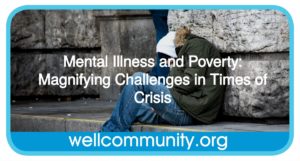
Health crises like the coronavirus pandemic impact us all. But, those who live with serious mental illnesses face unique challenges in times like this. Not only can uncertainty and fear trigger worsening of symptoms, but lack of access to things like healthy food, shelter and medical care can lead to a higher risk of illness.
The poverty faced by many who deal with life-altering mental health conditions plays a major role in magnifying the challenges of health crises. Below are several ways that those living with mental illnesses are especially impacted by lack of resources in times like these.
Underlying Health Challenges and Risk Factors
Both dealing with a mental illness and living below the poverty line increase a person’s risk for numerous of health conditions, including heart disease and diabetes. Many of these conditions are associated with a greater likelihood not only of contracting an infection but of becoming seriously ill from one.
In addition, living in poverty severely limits a person’s ability to maintain healthy, immunity-boosting habits such as eating regular, nutritious meals and getting adequate sleep and exercise. As a result, those facing the dual challenges of mental illness and poverty are often more susceptible to viruses.
Decreased Access to Care
Individuals managing mental illnesses face serious disparities in accessing health care. They’re less likely to have health insurance coverage than the general population; and those who are insured often struggle to find in-network providers. Poverty adds to these challenges in numerous ways; for example, lacking funds for transportation or medication can make it difficult or impossible to keep appointments and adhere to a treatment plan.
In times of crisis, when the health care system is stretched to the limit, those facing poverty and mental illness run into additional hurdles. For instance, when public transportation schedules are cut back, these individuals are often left without a way to get to and from doctors’ appointments. And, when counseling must be conducted remotely to maintain social distancing, those without access to the internet may be forced to forgo sessions altogether.
Lack of Shelter
Abiding by shelter-in-place guidelines is infinitely more challenging for those without a safe place to call home. And, for those dealing with mental illness and poverty, numerous hurdles stand in the way of finding and maintaining stable housing.
Serious mental health conditions are a major risk factor for homelessness and housing insecurity, and those in Texas who are most at risk lack adequate affordable housing options. According to the National Low-Income Housing Coalition, the state has a shortage of more than 600,000 affordable and available housing units for extremely low-income individuals. This has resulted in many living in shelters or on the streets: The Metro Dallas Homeless Alliance’s 2020 State of Homeless Report revealed that over 4,400 people are homeless in Dallas and Collin Counties alone, and as a result they are especially vulnerable in health crises.
The Well Community comes alongside those in the Dallas area who struggle with serious mental illnesses and poverty, helping them pursue mental health stability and access the resources and care that are available to them. In this time of crisis, The Well continues to serve this vulnerable population, providing nutritious lunches and hygiene products such as toilet paper, body wash, deodorant and toothpaste, as well as crisis management services when challenges are especially great. Visits by phone help prevent isolation when in-person community isn’t possible. Staff communicates with Jacob’s House members daily and is available 24/7 to address any needs so that residents remain healthy and safe. In these particularly difficult days, The Well provides especially vital support and connection.
Your gifts help us maintain contact and services to those who are in greatest need. Please Give Now.
